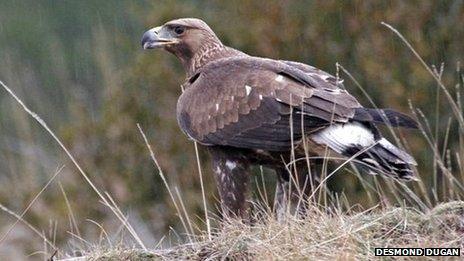'Bird sanctuary' warning over opposition to Lewis wind farm
- Published

The estate has one of the highest densities of golden eagles in Europe
The Isle of Lewis will become a bird sanctuary with no human occupants if wind farms are opposed, a landowner has warned.
Estate owner Nick Oppenheim told BBC Scotland that a planned extension to a wind farm would secure 150 jobs.
RSPB Scotland has voiced "serious alarm" at moves to expand a proposed 39-turbine development on the island's Eisgein Estate by 30 turbines.
The area has one of the highest densities of <link> <caption>golden eagles</caption> <url href="http://www.bbc.co.uk/nature/life/Golden_Eagle" platform="highweb"/> </link> in Europe.
International Power GDF Suez acquired the rights to the 39-turbine project from Mr Oppenheim in April.
Mr Oppenheim's company, Uisinis Power has now sought permission from Scottish ministers to start the moves towards an expansion.
International Power GDF Suez could potentially acquire the rights to the extension if approved.
<bold>'Without people'</bold>
Mr Oppenheim said the projects would help to slow depopulation of the island.
He said: "The extension will provide continuity for the 150 men taken on to build the first wind farm.
"Without that continuity they will lose their jobs.
"On Lewis the population has been in decline for many years. The population of eagles - both white-tailed and golden - has been in the ascendance now for many years."
Mr Oppenheim added: "If RSPB have their way and this trend is encouraged, Lewis will become a bird sanctuary without people."
RSPB Scotland said it was not opposed to wind power developments as a way of reducing carbon emissions and where it believed turbines do not pose serious threats to wildlife, or habitats.
However, it has strongly opposed the 39-turbine Eisgein project and the planned extension.
The charity said it believed the bird survey techniques used in putting together the planning applications were inadequate and underestimated the importance of the site to eagles.
- Published24 May 2012
- Published17 May 2012
- Published30 April 2012